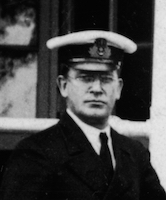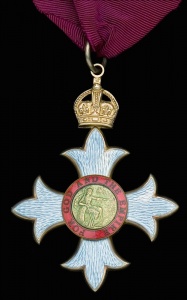Dr Frederick William Wheatley

Frederick William Wheatley (1871-1955), headmaster and cryptographer, was born on 7 June 1871 at Kapunda, South Australia, son of James Edward Wheatley, music teacher, and his wife Wilhelmina Magdalena, née Basedow. Educated at Prince Alfred College, Adelaide, in 1890 Frederick joined the teaching staff of Way College. On 28 June 1898 at St Peter's Anglican Church, Glenelg, he married Alice Ruth Kimber; they were to have three children. He taught at Prince Alfred College from 1901, studied at the University of Adelaide (BA, 1904), then transferred to King's College, Goulburn, New South Wales, in 1905. Appointed headmaster of Rockhampton Grammar School next year, he resigned in 1911 after clashing with the School Board. Meanwhile he had become a captain (1908) in the Senior Cadets and had begun an association with the proposed RANC, helping to draft the academic syllabus and college regulations.
Enrolling at Lincoln College, Oxford, Wheatley studied the ionization of gases and graduated BSc in 1913; in that year the University of Adelaide awarded him a DSc. Before returning to Australia, he visited Germany where he improved his knowledge of the language and, by his own account, had conversations with Admiral von Tirpitz and General von Hindenburg. Appointed Senior Naval Instructor on 6 February 1914, he joined the RANC at Osborne House, Geelong, Victoria, to teach mathematics and physics.
On the outbreak of World War I he was seconded to Navy Office, Melbourne, to work with Captain WHC Thring [q.v.] and was placed in charge of intercepted enemy radio messages.
On 4 August 1914 the German steamer Seydlitz left Sydney hurriedly and Naval authorities were convinced that she intended to warn German vessels on their way to Australia to turn back, as many would not yet know that a state of war existed between Britain and Germany. The German liner Hobart was one such vessel which had left Fremantle the same day bound for Melbourne. To prevent Hobart from receiving messages from Seydlitz wireless stations in southern Australia were ordered by Captain Thring to jam signal traffic continuously day and night. The plan succeeded and when Hobart entered port she was boarded by Captain John Richardson, the District Naval Officer, and a naval party disguised as quarantine officials. After bluffing his way on board and ensuring that the vessel was safely under the land batteries, Richardson took control, but still allowed the crew a degree of freedom. Despite the presence of two expert searches from the Customs Department, Richardson's party initially found nothing of interest. But that night he elected to retire to the captain's bunk, and there feigned sleep. Just before 4:00am, two men stealthily opened the cabin door and entered. They had just begun to force open a panel under the desk when Richardson brought up his revolver, flashed on a light and took the master and his carpenter prisoner. A search revealed a hidden safe, containing among other papers a copy of the German Merantile Code Book or Handelsverkehrsbuch (HVB) and more importantly its cipher key. These were passed to Wheatley for translation.
With the aid of a captured code book, Wheatley worked out the cypher key used to encrypt messages sent by Vice Admiral Graf von Spee's Pacific Squadron. Wheatley's brilliant work earned him the thanks of the Admiralty:
The intelligence he supplied may have validated the decision to position the RN's superior forces which destroyed von Spee's ships in the battle of the Falkland Islands in December.
In 1915 Wheatley returned to the RANC taking with him a letter from Captain Thring expressing the hope that history will give Dr Wheatley the recognition he deserves.
During his absence from the College it had been relocated at Jervis Bay, part of the Australian Capital Territory situated on the New South Wales south coast. He became headmaster in 1920, the year when the academic staff were reclassified as civil officers. Throughout his tenure the College suffered from its geographical isolation and faced threat of closure. These problems may have cramped Wheatley's intellectual capacity and contributed to his sensitivity to real or imagined slights. While a difficult colleague, he was a proficient educationist and gained the affection of the cadets among whom he was known as 'Pa'. Bespectacled, with blue eyes and curly hair, he was an imposing figure, despite being only 5 ft. 8 ins. (172.7cm) tall. He left the RANC in 1930 when it was transferred to Flinders Naval Depot, Victoria, taking with him the appreciation of the Naval Board for his 'conspicuous success' in educating cadets to standards which enabled them as officers to take high places in examinations during subsequent training with the RN.
From January 1931 to February 1932 Wheatley was Director of Studies at the Cranbrook School, Sydney. Appointed CBE in 1932, in his retirement he was an Office Bearer in the Royal Empire Society. Although Wheatley is remembered chiefly for his codebreaking work his greatest legacy was judged to be the secure direction of the RAN's officer education.
Survived by a son and daughter, he died on 14 November 1955 at Cremorne and was cremated. His son Ross served in the RAN in 1914-53 and held the rank of Acting Captain.
Special thanks to Robert Hyslop and Dr David Stevens from whose works this biography was edited.
Further reading
'In All Respects Ready' by David Stevens, Oxford University Press, Melbourne, 2014, pp 95-96.



